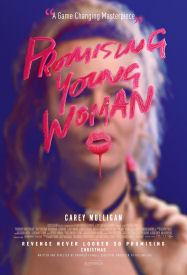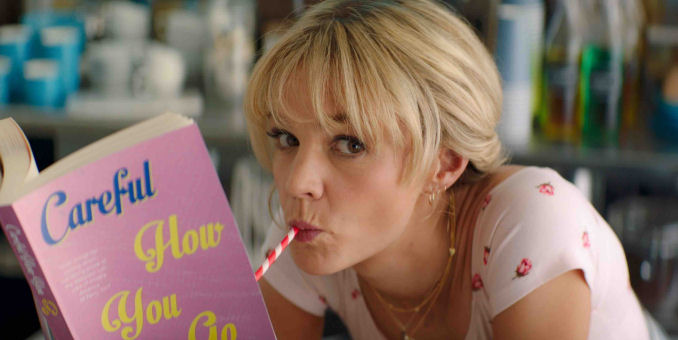 From its opening shot, Promising Young Woman is a movie on a mission. Much like its title protagonist, this debut feature from writer/director Emerald Fennell stages a direct on assault on rape culture and society’s often hypocritical and dismissive attitude towards it. And it manages to do so within the confines of a story that is at turns a thriller and a character study.
From its opening shot, Promising Young Woman is a movie on a mission. Much like its title protagonist, this debut feature from writer/director Emerald Fennell stages a direct on assault on rape culture and society’s often hypocritical and dismissive attitude towards it. And it manages to do so within the confines of a story that is at turns a thriller and a character study.
Cassie (Carey Mulligan) seemed to have been on the path for great success. A medical student with a bright future in front of her, she suddenly dropped out of college, moved back in with her parents and started working at a coffee shop. But at night she leads a double life. Heading out to bars and clubs, she feigns drunkenness until a “nice guy” offers to take her home. Inevitably these good Samaritans detour to their own domicile where they attempt to take advantage of Cassie’s perceived inebriated state. And that is when Cassie drops her pretense and confronts her would-be sexual assailant. Cassie finds herself having second thoughts about her mission against sexual predators after she reconnects with a former med school classmate Ryan (Bo Burnham) who truly seems to be an actual nice guy. But would setting aside her mission be a betrayal of the reason she embarked on it in the first place?
To be sure, there have been lots of rape-and-revenge stories that have graced the silver screen over the years. It was an exploitation sub-genre that flourished somewhat in the 1970s and lived long enough into the early days of home video in the mid-1980s. It is one of the main inspirations that Quentin Tarantino was drawing from for his Kill Bill duology. But nearly all of those films have been shot by men, and as such, can’t seem to shake themselves of the need to visually exploit the victim. So we have assault scenes with nudity or sequences where the woman dresses seductively before heading out to ensnare her next target while the camera lingers somewhat lasciviously over them. But director Fennell avoids such objectification. When Cassie goes to seduce a man, Fennell turns the camera on them to show the leering that women are subjected to. If anyone is confused about the idea of the male and female gaze when it comes to filmmaking, Promising Young Woman provides a stark and effective example.
The film is understandably and rightfully mad at the dismissive idea that “boys will be boys” and the harm it causes for their female victims. And much like its heroine, Promising Young Woman does not pull any punches, calling out men who attempt to take advantage of a drunk woman to anyone who would be complicit with excusing such behavior, no matter their gender. And at no time does the film feel like it is merely going down a checklist of points it wants to make. It organically follows Carrie on her journey as she confronts predators and their enablers and then finally herself and her actions, all the while never becoming didactic or preachy. The film deals with its subject with a raw, harsh honesty, while still staying within the context of a story that engages and entertains.
It should be noted that the word “rape” is never uttered once in the course of the film’s run time. But it doesn’t need to be. Its specter hangs over every scene, infusing every decision and action of the main players. And the fact that so many conversations dance around not even daring to utter the word is an indictment of society’s own inability to address the issues with which the film is dealing.





